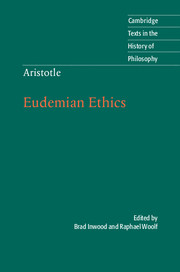Book I
Published online by Cambridge University Press: 05 February 2013
Summary
i.1.1 The poet who declared his opinion at the god’s site in Delos, inscribing it on the gateway of the Temple of Leto, distinguished the good, the fine and the pleasant as not all belonging to the same thing. He wrote: ‘Finest is what is most just, best is being healthy, most pleasant of all is to attain what one desires.’ We should not agree with him. For happiness, being finest and best, is the most pleasant of all things.
i.1.2 There are many points of interest concerning each kind of object and nature that create difficulty and need examining. Some of these pertain only to our knowing, others pertain to the acquisition of the object and to actions as well. i.1.3 Regarding those that involve only theoretical philosophy, we must state, when the right opportunity presents itself, whatever is appropriate to the field of enquiry. i.1.4 First, however, we must examine what living well consists in and how it is to be achieved.
Do all who acquire this label get to be happy by nature, as with tallness and shortness and differences in skin colour? Or is it through learning, happiness being a kind of knowledge? Or is it through some sort of practice? After all, people acquire many qualities not by nature or learning but by habituation; bad qualities if they are badly habituated, good qualities if they are well habituated. Or is it in none of these ways, i.1.5 but in one or other of the following: by the influence of some divine force, like those people possessed by nymphs or gods, as if inspired; or by luck, since many people claim that happiness and good fortune are the same thing? i.1.6 Evidently it comes to be present in people in all or some or one of these ways. For pretty much everything one gets can be attributed to these sources, since actions based on thought can be grouped together with those that result from knowledge.
- Type
- Chapter
- Information
- Aristotle: Eudemian Ethics , pp. 3 - 14Publisher: Cambridge University PressPrint publication year: 2012

